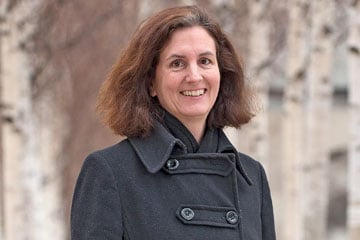
Bencher candidates practising outside of the Greater Toronto Area say lawyers in their regions are looking for better communication from the Law Society of Ontario and support of local law associations and libraries.

Bencher candidates practising outside of the Greater Toronto Area say lawyers in their regions are looking for better communication from the Law Society of Ontario and support of local law associations and libraries.
“The majority of lawyers in the province are sole licensees or in small practices — they aren’t members of big, provincewide law firms or law firms that have offices internationally. It’s really important that we always keep sight of that, because that’s a huge access to justice issue — it’s about having lawyers across the province connected to the supports they need to be competent lawyers. It’s important for protection of the public,” says Goderich, Ont.-based Teresa Donnelly, the West Region Sexual Violence Crown at the Ministry of the Attorney General who is a bencher running for re-election.
“Part of it is connecting lawyers to those resources that already exist but also being committed to the law associations and understanding really what lawyers who are outside of Toronto, especially in rural or remote areas, really need,” she says.
These issues have come to the fore ahead of the April 30 bencher election.
Lawyers will elect up to 40 lawyer representatives to the law society’s board of benchers in the election, including 20 from outside Toronto for what the LSO says will “ensure adequate regional representation.”
Since 1999, the LSO has had a “regional” bencher scheme where the candidate who receives the highest number of votes in each of the eight electoral regions joins Convocation, according to the LSO’s election website and 2015 election results.
Other than Toronto, the regions are divided by counties and municipalities in Ontario that include: northwest (Kenora, Rainy River and Thunder Bay), northeast (Algoma, Cochrane, Manitoulin, Nipissing, Parry Sound, Sudbury and Timiskaming); southwest (Elgin, Essex, Huron, Kent, Lambton, Middlesex, Oxford and Perth); central east (Muskoka, Haliburton, Northumberland, Peterborough, Simcoe, Victoria, Durham and York); central west (Bruce, Dufferin, Grey and Wellington, Halton and Peel); and central south (Brant, Haldimand-Norfolk, Hamilton-Wentworth, Niagara and Waterloo). Ottawa and the remaining areas are in the east electoral region, the law society’s website said.
Donnelly, who says she hopes to stress the importance of local law associations if re-elected to Convocation, says she has not noticed any sort of divide within Convocation between lawyers inside and outside Toronto.
But Steve Rastin, managing partner of Rastin & Associates, who has offices in Midland and Barrie, Ont., says there is a perception that Convocation has a lot of lawyers tied to large, downtown Toronto law firms and that Convocation focuses on issues that may be more relevant to a certain demographic of lawyers.
“I was blessed to be able to develop a good perspective as president of the Trial Lawyers Association. I travelled all over the province and talked to lawyers, to paralegals and judges,” says Rastin. “Our region is very geographically large. It is urban and rural.”
For one thing, he says, regional libraries — regulated by the law society through LibraryCo — are essential for practitioners who can’t afford online databases or travelling, says Rastin.
Rastin also says he opposes propositions to further shrink the number of benchers in Convocation.
“I have serious concerns.,” he says. “[Wi]th great respect, what matters to a lawyer practising in a Bay Street firm in Toronto could very well be different from what matters to a small-town lawyer practising family law in Collingwood.”
Jerry Udell, senior counsel at Miller Canfield LLP in Windsor, who is running for re-election as a bencher, says there was a learning curve for him when becoming a bencher but that there is still room for improvement within Convocation.
“The farther away you are from the GTA, the less effective the communication is. I think the law society needs to be better at communicating with its members,” says Udell.